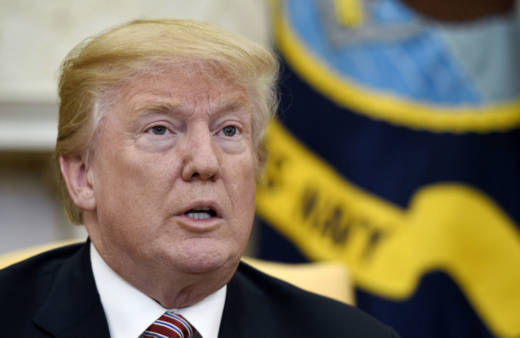While the Nunes memo is 4 pages long, people who have read it told NPR's Philip Ewing that the Schiff memo is 10 pages and contains many footnotes intended to rebutt arguments made by the GOP document.
The House intelligence committee voted Monday to release the Democratic memo, but it was up to President Trump whether or not to declassify the information contained it and give his approval for its release as he did last week with the Nunes memo. Democrats urged him to make the memo public, and even top Republican leaders such as House Speaker Paul Ryan, R-Wis., agreed it should be released just as the Nunes memo had been.
Senate Minority Leader Chuck Schumer, D-N.Y., blasted Trump's decision, saying the president's "double standard when it comes to transparency is appalling."
"The rationale for releasing the Nunes memo, transparency, vanishes when it could show information that's harmful to him. Millions of Americans are asking one simple question: what is he hiding?" Schumer also said in a statement.
The Nunes memo was declassified and released without any redactions, and Trump saw the document as evidence that the investigation by DOJ special counsel Robert Mueller was politically motivated.
"This memo totally vindicates 'Trump' in probe. But the Russian Witch Hunt goes on and on. Their [sic] was no Collusion and there was no Obstruction (the word now used because, after one year of looking endlessly and finding NOTHING, collusion is dead). This is an American disgrace!" the president tweeted last Saturday, one day after the Nunes memo was released.
However, the Nunes memo also shows that the Justice Department and the FBI did not launch their probe into Russian interference in the 2016 election because of an unverified dossier about Trump and Russia compiled by former British spy Christopher Steele. Republicans have seized on the Steele dossier because he was commissioned by the political research firm Fusion GPS, which was hired by the Democratic National Committee and Hillary Clinton's campaign.
Instead, it was Trump campaign foreign policy adviser George Papadopoulos and meetings he had with agents of the Kremlin where he was offered dirt on Hillary Clinton that triggered the investigation, the Nunes memo says. Papadopoulos has pleaded guilty to lying to the FBI about his contacts with Russians and Russian agents.
Trump also seized on revelations in the Nunes memo that Deputy Attorney General Rod Rosenstein approved a warrant application for surveillance on Page, raising the specter that the president could fire him which would trigger a potential crisis in who would oversee Mueller's investigation, since Attorney General Jeff Sessions has recused himself from the probe.
The White House has denied it is considering terminating Rosenstein. If that did happen, though, responsibility for overseeing the Mueller probe would then fall to the No. 3 official at the Justice Department, Associate Attorney General Rachel Brand. However, Brand just announced Friday she will be departing the Justice Department in the coming weeks for a job in the private sector.
Rosenstein met with Trump on Tuesday to talk about the countermemo and begin the declassification review.
In a letter also released Friday by the White House, Rosenstein provided justification to the White House for not releasing the Schiff memo right now, writing in a letter to McGahn that the Justice Department has identified sections of the Democratic memo "the release of which would present such concerns in light of longstanding principles regarding the protection of intelligence sources and methods, ongoing investigations, and other similarly sensitive information," along with other "information for which national security or law enforcement concerns are especially significant."
Copyright 2018 NPR. To see more, visit http://www.npr.org/.
9(MDAxOTAwOTE4MDEyMTkxMDAzNjczZDljZA004))

9(MDAxOTAwOTE4MDEyMTkxMDAzNjczZDljZA004))
